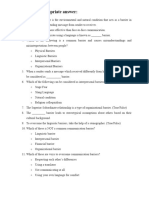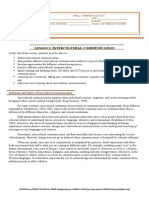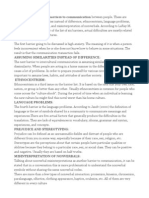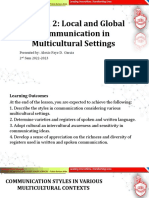Questionnaire
Questionnaire
Uploaded by
blueswanCopyright:
Available Formats
Questionnaire
Questionnaire
Uploaded by
blueswanCopyright
Available Formats
Share this document
Did you find this document useful?
Is this content inappropriate?
Copyright:
Available Formats
Questionnaire
Questionnaire
Uploaded by
blueswanCopyright:
Available Formats
QUESTIONNAIRE
Misunderstandings in Cross-cultural Communication
Note: This is a check-list type of questionnaire. While answering the questions, you can check
more than one answer if necessary. If you are choosing the “other” option, you may write
your explanation briefly next to it. The questions 8 and 9 are lickert-scale type of questions.
So, choose the best option in those questions.
Your name & surname: ____________________________
1) Can you please write which nation/cultural background are you from?
___________________
2) Have you ever communicated with someone from another nation/cultural background?
____No
____Yes, indirectly. (online, on phone, by written ways, etc.)
____Yes, directly. (face-to-face)
____Other:
3) Have you ever been in a cross-cultural communication which ended up in
misunderstanding?
____No
____Yes, I misunderstood the person I talked to.
____Yes, I was misunderstood.
____Other:
4) In cross-cultural communication, have you ever misunderstood someone and/or been
misunderstood due to the causes indicated below? Check the applicable one(s).
____Verbal misunderstandings (misunderstanding the words/language used)
____Vocal misunderstandings (misunderstanding what is indicated due to the tone of voice)
____Non-verbal misunderstandings (misunderstanding the body language/gestures etc.)
____None
____Other:
5) In daily life cross-cultural communication, which type of misunderstanding below do you
think is more common? Check the applicable one(s).
____Verbal misunderstandings (misunderstanding the words/language used)
____Vocal misunderstandings (misunderstanding what is indicated due to the tone of voice)
____Non-verbal misunderstandings (misunderstanding the body language/gestures etc.)
____Other:
6) In cross cultural communication, what is more important to you in order not to cause
misunderstandings? Check the applicable one(s).
____Right choice of words
____Right use of voice
____Right use of body language (including facial expressions, gestures, etc.)
____None
____Other:
7) Do you think that speaking in the same language can overcome the misunderstandings in
cross-cultural communication?
____Yes, speaking the same language is enough.
____Yes, if the language is spoken fluently it is enough.
____No, even if the language is spoken fluently it is not enough.
____Other:
8) While communicating with someone in the same language, I think his/her cultural
background is important. (Choose the most appropriate one, circle the number under it.)
Always Usually Sometimes Seldom Never
5 4 3 2 1
9) When different cultural backgrounds are involved, I feel like there are communicating
barriers between me and the people I am communicating with. (Choose the most appropriate
one, circle the number under it.)
Always Usually Sometimes Seldom Never
5 4 3 2 1
10) If you feel as if there are communicating barriers, what do you think the main reason(s)
is?
____Language related (not speaking the same language, not speaking a mutual language fluently,
foreign accent, using wrong words, expressions, etc.)
____Culture related (being from very different cultural background, having different expressions,
gestures, etc.)
____None
____Other:
You might also like
- Templeton. Teaching English To Teens and PreteensDocument274 pagesTempleton. Teaching English To Teens and PreteensNicole Michel100% (4)
- The Structural Design of Air and Gas Ducts For Power Stations and Industrial Boiler ApplicationsDocument308 pagesThe Structural Design of Air and Gas Ducts For Power Stations and Industrial Boiler Applicationsblueswan100% (5)
- The Phrygian Language (Bartomeu Obrador-Cursach) (Z-Library)Document698 pagesThe Phrygian Language (Bartomeu Obrador-Cursach) (Z-Library)buce530% (1)
- Access Steel Data Sheets BindedDocument154 pagesAccess Steel Data Sheets Bindedblueswan100% (1)
- Moody's ChartDocument100 pagesMoody's Chartbsk109100% (3)
- Angol C1 Írásbeli ORIGODocument7 pagesAngol C1 Írásbeli ORIGOToth MankaNo ratings yet
- Angel QuizDocument25 pagesAngel QuizMonica Docutan50% (2)
- Language CompetenceDocument10 pagesLanguage CompetenceJose Antonio100% (4)
- Second-Order Effects in Portal Frames To Eurocode 3Document3 pagesSecond-Order Effects in Portal Frames To Eurocode 3blueswanNo ratings yet
- jhhhDocument2 pagesjhhhanujkorpakwad830No ratings yet
- Self-Assesment 2Document1 pageSelf-Assesment 2svchronoNo ratings yet
- Lesson 2 Intercultural CommunicationDocument4 pagesLesson 2 Intercultural CommunicationMarvin Salvador100% (1)
- Prelims - 1a The Nature of Language PDFDocument33 pagesPrelims - 1a The Nature of Language PDFCezar PunoNo ratings yet
- Intercultural Communication QST!Document3 pagesIntercultural Communication QST!eddehbi51498No ratings yet
- Ethics in CommunicationDocument6 pagesEthics in CommunicationMariz TanNo ratings yet
- Ylp Hand OutsDocument9 pagesYlp Hand OutsSaima AbediNo ratings yet
- Language AttitudesDocument2 pagesLanguage AttitudesengrmalikhanNo ratings yet
- Comprehension QsDocument4 pagesComprehension QsPatrick92% (12)
- Keeping Culture in Mind 2 UnitExitDocument6 pagesKeeping Culture in Mind 2 UnitExitYvonne HynsonNo ratings yet
- Needs Analysis FallDocument3 pagesNeeds Analysis Fallapi-241811387No ratings yet
- Angol C1 Írásbeli Feladatsor Web 2022 FKDocument7 pagesAngol C1 Írásbeli Feladatsor Web 2022 FKTMPKNo ratings yet
- Ielts Match Headings Communication Reading Reading Comprehension Exercises - 144371Document2 pagesIelts Match Headings Communication Reading Reading Comprehension Exercises - 144371jobsforall jobsNo ratings yet
- Introduction To SociolinguisticsDocument13 pagesIntroduction To Sociolinguisticsimqueen997No ratings yet
- 3 5 Work FileDocument3 pages3 5 Work FileTonia BrownNo ratings yet
- EssayDocument3 pagesEssayCamieya AcancesNo ratings yet
- PurCom Wk1&Wk2Document9 pagesPurCom Wk1&Wk2Julia MacugayNo ratings yet
- Worksheet-Worksadlfhops For IPC Unit 2Document2 pagesWorksheet-Worksadlfhops For IPC Unit 2Xin YouNo ratings yet
- Purposive Communication Lesson 1 and 2Document7 pagesPurposive Communication Lesson 1 and 2clarencelazaro114No ratings yet
- Appendixes WeeblyDocument7 pagesAppendixes Weeblyapi-355425447No ratings yet
- Lesson 1 - Learning LanguagesDocument6 pagesLesson 1 - Learning Languages259No ratings yet
- Cep I4 Needs AnalysisDocument2 pagesCep I4 Needs Analysisapi-273373739No ratings yet
- Lang Hist FormDocument1 pageLang Hist Formanon_489288158No ratings yet
- TopicsDocument4 pagesTopicsYana DemchenkoNo ratings yet
- What Is The Image Saying About The World Today?Document3 pagesWhat Is The Image Saying About The World Today?Malaluan, Njel Shane L.No ratings yet
- Sociolinguistics Unit 1 2 3 4Document356 pagesSociolinguistics Unit 1 2 3 4Karina Avilés CervantesNo ratings yet
- Fictional CountryDocument22 pagesFictional CountryDelfwoodAlacyangNo ratings yet
- Intercultural Communication ActivitiesDocument17 pagesIntercultural Communication ActivitieschicanalizaNo ratings yet
- Proyeto 4 Uso de Diversos Textos en InglesDocument15 pagesProyeto 4 Uso de Diversos Textos en Inglesjehieli villarrealNo ratings yet
- Essential Questions and Enduring Understandings in World LanguageDocument5 pagesEssential Questions and Enduring Understandings in World LanguageVeronika KozelNo ratings yet
- Interpersonal and Intercultural CommunicationDocument49 pagesInterpersonal and Intercultural Communicationdearestra100% (3)
- Unit 1Document10 pagesUnit 1gqobatshiamoNo ratings yet
- 2004 Module 2 Essay: General Notes For Communication StudiesDocument4 pages2004 Module 2 Essay: General Notes For Communication StudiesJoelNo ratings yet
- AFL1501 Unit 1Document12 pagesAFL1501 Unit 1mrmlambo47No ratings yet
- Lesson C-B. LanguageDocument26 pagesLesson C-B. Languageirish xNo ratings yet
- Self-Assessment 3Document1 pageSelf-Assessment 3svchronoNo ratings yet
- Theories and Principle PF MTB-MLEDocument3 pagesTheories and Principle PF MTB-MLEmaurincesoberano1No ratings yet
- III A. Preliminaries (This Part Will Contain The Springboard, Motivation or Other Activities That May Introduce / Begin The Lesson)Document6 pagesIII A. Preliminaries (This Part Will Contain The Springboard, Motivation or Other Activities That May Introduce / Begin The Lesson)Yanyan EducNo ratings yet
- C H A P T R E: Language and CommunicationDocument161 pagesC H A P T R E: Language and Communicationۦۦ ۦۦNo ratings yet
- Difficulties in Speaking EnglishDocument3 pagesDifficulties in Speaking EnglishkufatimahNo ratings yet
- Idioms & Grice's Maxim 2Document9 pagesIdioms & Grice's Maxim 2mansurrzgar123No ratings yet
- Sample Needs Analysis QuestionnaireDocument5 pagesSample Needs Analysis QuestionnaireSalVelasquezNo ratings yet
- Adapted and Expanded From R. Wintrob, Brown University, by R. Goldman, Brown University. © Project ADEPTDocument2 pagesAdapted and Expanded From R. Wintrob, Brown University, by R. Goldman, Brown University. © Project ADEPTmary engNo ratings yet
- Bcom SDocument4 pagesBcom StbendeNo ratings yet
- Final Global Perspective Project - Languages and BarriersDocument7 pagesFinal Global Perspective Project - Languages and BarriersSoe ThiriNo ratings yet
- Conceptualunit MethodsDocument14 pagesConceptualunit Methodsapi-219742201No ratings yet
- Sign Languages CR Qs KopyasıDocument2 pagesSign Languages CR Qs Kopyasıxr8rqs7nskNo ratings yet
- The Way We Communicate With Others and With Ourselves Ultimately Determines The Quality of Our Lives.Document3 pagesThe Way We Communicate With Others and With Ourselves Ultimately Determines The Quality of Our Lives.Shem MacalandaNo ratings yet
- Lesson 2Document22 pagesLesson 2Hyacinth AlbertoNo ratings yet
- Purposive Communication Task No.!Document8 pagesPurposive Communication Task No.!Jaybee GuintoNo ratings yet
- Afl1501 Unit 1Document16 pagesAfl1501 Unit 1Rochell NaikerNo ratings yet
- Sociolinguistics (Essay)Document6 pagesSociolinguistics (Essay)Youniverse0% (1)
- Afl1501 Unit 4Document27 pagesAfl1501 Unit 4Rochell NaikerNo ratings yet
- Tugas 2 Discourse Analysis (MG)Document3 pagesTugas 2 Discourse Analysis (MG)Mega WNo ratings yet
- The Job Interview Workbook: A Workbook for College Students and JobhuntersFrom EverandThe Job Interview Workbook: A Workbook for College Students and JobhuntersNo ratings yet
- Typical Connection Calculation ReportDocument38 pagesTypical Connection Calculation ReportblueswanNo ratings yet
- Load Combinations Book EC3Document29 pagesLoad Combinations Book EC3blueswan100% (1)
- Çeşitli Bağlantı Tiplerinin HesabıDocument63 pagesÇeşitli Bağlantı Tiplerinin HesabıblueswanNo ratings yet
- Literacy FormDocument2 pagesLiteracy Formantonio comendoNo ratings yet
- 21st Century Literature From The Philippines and The World Quarter 1 Module 1: Lesson 2 Dimensions of Literary Text II. Pre-Test Activity 1Document7 pages21st Century Literature From The Philippines and The World Quarter 1 Module 1: Lesson 2 Dimensions of Literary Text II. Pre-Test Activity 1Julius CabinganNo ratings yet
- Nature and Scope of CommunicationDocument18 pagesNature and Scope of CommunicationTejaswi Nisanth100% (1)
- Think L3 SBDocument11 pagesThink L3 SBZaki Lamaxhema0% (1)
- Language Policy, Politics, and Diversity in EducationDocument194 pagesLanguage Policy, Politics, and Diversity in EducationUk matsNo ratings yet
- Problem Determined Systems: Towards Transformation in Family TherapylDocument13 pagesProblem Determined Systems: Towards Transformation in Family TherapylPérola SouzaNo ratings yet
- Porch Noun - DefinitionDocument1 pagePorch Noun - DefinitionkhanhtruongNo ratings yet
- Comparing Systems of GovernmentDocument2 pagesComparing Systems of Governmentapi-328061525No ratings yet
- Guimaras State College: College of Teacher EducationDocument9 pagesGuimaras State College: College of Teacher EducationJanet Aguirre CabagsicanNo ratings yet
- 1st Summative Test in Oral CommunicationDocument27 pages1st Summative Test in Oral CommunicationJoyce SotyagNo ratings yet
- TIỂU LUẬN NHÓM - NHÓM 5 - SÁNG THỨ 3Document11 pagesTIỂU LUẬN NHÓM - NHÓM 5 - SÁNG THỨ 3Vòng Bảo NgọcNo ratings yet
- Transitive Phrasal Verbs 001-2Document1 pageTransitive Phrasal Verbs 001-2edgardo apolino carpioNo ratings yet
- 3rdQLP2G9 1Document8 pages3rdQLP2G9 1Daniela CloresNo ratings yet
- Hispanoáfrica - Wikipedia, La Enciclopedia LibreDocument6 pagesHispanoáfrica - Wikipedia, La Enciclopedia LibreYohan RodriguezNo ratings yet
- Written Test In English - Time: 45' (1 Term) N 1: following sentences (Lựa chọn đúng nhất cho mỗi câu dưới đây)Document2 pagesWritten Test In English - Time: 45' (1 Term) N 1: following sentences (Lựa chọn đúng nhất cho mỗi câu dưới đây)api-3727838No ratings yet
- ITP - Chapter 7Document41 pagesITP - Chapter 7Azeljoy Escalona TerminezNo ratings yet
- Đề Thi Thử TN THPT 2021 - Môn Tiếng Anh - THPT Chuyên Bắc Ninh - Lần 2 - File Word Có Lời GiảiDocument28 pagesĐề Thi Thử TN THPT 2021 - Môn Tiếng Anh - THPT Chuyên Bắc Ninh - Lần 2 - File Word Có Lời GiảiHuyền KhánhNo ratings yet
- TEFL - Teaching Across Proficiency LevelsDocument15 pagesTEFL - Teaching Across Proficiency LevelsMaulidea PutriNo ratings yet
- HTTPS:WWW - hoddereducation.com:media:Documents:International:Checkpoint:9781398311350 Checkpoint World Eng 7 WB SampleDocument14 pagesHTTPS:WWW - hoddereducation.com:media:Documents:International:Checkpoint:9781398311350 Checkpoint World Eng 7 WB SampleNatalie MuslehNo ratings yet
- Montessori MaterialsDocument7 pagesMontessori MaterialsRaluca-daniela Silaghi100% (2)
- Fos QuizDocument1 pageFos QuizMarryRose AfroilanNo ratings yet
- ACTFL WPT Review - Yinghua CaiDocument28 pagesACTFL WPT Review - Yinghua Caiyinghua_cai100% (1)
- Greek Dialects - Buck PDFDocument354 pagesGreek Dialects - Buck PDFJack HenriquezNo ratings yet
- Trojan Bloom Vol. 3, Spring 2023Document125 pagesTrojan Bloom Vol. 3, Spring 2023USC Center for Languages and CulturesNo ratings yet
- The Study of Language EssayDocument13 pagesThe Study of Language EssayQuý NguyênNo ratings yet
- MA Thesis by Le Bich ThuyDocument118 pagesMA Thesis by Le Bich ThuyYu Phong100% (1)
- Examples: - She Speaks English - Does She Speak English? - You Do Not Speak EnglishDocument3 pagesExamples: - She Speaks English - Does She Speak English? - You Do Not Speak EnglishAndreas Alvonso Y LNo ratings yet
- English 8 Worksheet - ContextcluesDocument2 pagesEnglish 8 Worksheet - ContextcluesFlamingPlayz YTNo ratings yet
































































































